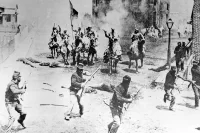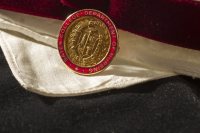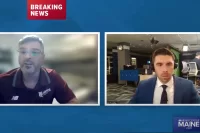
Welcome to the 28th edition of the Bates community’s annual summer reading list, aka Good Reads: The Bates College Non-Required Reading List for Leisure Moments.
Begun and named in 1997 by Sarah Emerson Potter ’77, the longtime former Bates College Store director, Good Reads brings together the readers — and their bookshelves — of the broad Bates community, including alumni, current and retired staff, and faculty.
In 2017, Alison Keegan in the Office of the Dean of the Faculty took over the annual tradition of collecting and compiling submissions.
“Thanks to you, Bates community, who let me know every year how important this tradition remains,” Keegan said as she offered this year’s edition to the community. “May you find endless new worlds to explore from these pages.”
Fifty-six members of the Bates community — faculty, staff, alumni, retirees — submitted book titles this year, and Keegan reports that these titles have two or more recommendations:
- The Immortalists by Chloe Benjamin
- Horse by Geraldine Brooks
- Lessons in Chemistry by Bonnie Garmus
- The Women by Kristin Hannah
- Yours Truly by Abby Jimenez
- Small Things Like These by Claire Keegan
- Under the Whispering Door by TJ Klune
- Just East of Nowhere by Scot Lehigh
- The Heaven and Earth Grocery Store by James McBride
- Our Missing Hearts by Celeste Ng
- Tom Lake by Ann Patchett
- The Covenant of Water by Abraham Verghese
- Tomorrow, and Tomorrow, and Tomorrow by Gabrielle Zevin
Tobie Akerley Gordon, Academic Support Services
- When Women Were Dragons by Kelly Barnhill.
- The Tattooist of Auschwitz by Heather Morris.
- Horse by Geraldine Brooks.
- Prophet Song by Paul Lynch.
- The Seven Husbands of Evelyn Hugo by Taylor Jenkins Reid.
- The Vanishing Half by Brit Bennett.
- Under the Whispering Door by TJ Klune.
Casey Andersen ’12, Office of College Advancement
Chain-Gang All-Stars by Nana Kwame Adjei-Brenyah. “Loretta Thurwar and Hamara ‘Hurricane Staxxx’ Stacker are the stars of the Chain-Gang All- Stars, the cornerstone of CAPE, or Criminal Action Penal Entertainment, a highly popular, highly controversial profit-raising program in America’s increasingly dominant private prison industry. It’s the return of the gladiators, and prisoners are competing for the ultimate prize: their freedom.” — Pantheon Books
Anita de Monte Laughs Last by Xóchitl González. “About a first-generation Ivy League student who uncovers the genius work of a female artist decades after her suspicious death.” — Flatiron Books
Sing, Unburied, Sing by Jesmyn Ward. “An epochal story, a journey through Mississippi’s past and present that is both an intimate portrait of a family and an epic tale of hope and struggle.” — Scribner
The Round House by Louise Erdrich. “Story of a boy on the cusp of manhood who seeks justice and understanding in the wake of a terrible crime that upends and forever transforms his family.” — Harper
Judith Ayugi, College Store
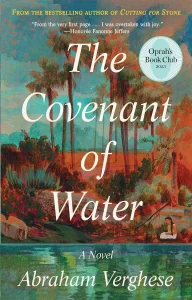
- Where the Crawdads Sing by Delia Owens.
- A House in the Sky: A Memoir by Amanda Lindhout.
- The Covenant of Water by Abraham Verghese.
- Beneficence by Meredith Hall.
- This Other Eden by Paul Harding
- Salt Houses by Hala Alyan.
Pavel Bačovský, Department of Politics
This year, I would like to recommend Freedom to Win: A Cold War Story of the Courageous Hockey Team That Fought the Soviets for the Soul of Its People — And Olympic Gold by Ethan Scheiner. This book is great for anyone who loves ice hockey, the nexus of sport and politics, or the Cold War political history. You may enjoy this book if you like Miracle on Ice, Beartown, Amy Bass’s One Team, or something like Welcome to Wrexham.
Jim Bauer, retired colleague
Dead Man’s Wake by Paul Doiron. Game Warden Mike Bowditch’s engagement party is interrupted by the discovery of a gruesome double murder in Dead Man’s Wake, a thriller from Edgar Award- nominated author Paul Doiron. “Doiron’s crisp first-person narrative is thoroughly absorbing and richly atmospheric. Readers will enjoy every pine needle–crunching step.” — Booklist
Another author I’m enjoying is Randy Wayne White and his Doc Ford series. I’m on Book 4 but they all are good.
Bobby Bosse, Post & Print
A Quantum Love Story by Mike Chen. A science fiction novel about two strangers working together to break a time loop that involves them living the same four days on repeat with some unexpected twists. Groundhog Day meets Star Trek.
11/22/63 by Stephen King. A man discovers a portal that takes him back to 1958 and devises a plan that involves him living in the past for five years to prevent the JFK assassination. Different from King’s other works, this is more suspense than horror.
I’ve Got Your Number by Sophie Kinsella. A woman finds a phone in the trash and starts using it as her own. A silly romantic comedy that’s a fun and quick read.
Wells Castonguay, Center for Inclusive Teaching and Learning
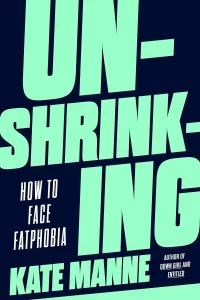
Unshrinking: How to Face Fatphobia by Kate Manne. To quote Manne, this book is “part memoir, part polemic, and part (all?) philosophy” and “aims to show why fatphobia is a vital social justice issue and provide an analysis of what fatphobia is and how it works.” Working through Manne’s personal narrative and evidence-based arguments is especially important for us in higher education, our highly fatphobic higher education.
Which Side Are You On by Ryan Lee Wong. What do our students wrestle with? Identities. Relationships. Activism. Advocacy. Dissent. Power. Positionality. Intersectionality. Violence. Authority.
In this novel, we glimpse these complexities and challenges through the eyes of Reed, a 21-year-old Asian American considering dropping out of his prestigious college because he’s angry and inspired to do something and be someone in the wake of a killing of a Black man by an Asian American police officer.
Jonathan Cavallero, Department of Rhetoric, Film, and Screen Studies
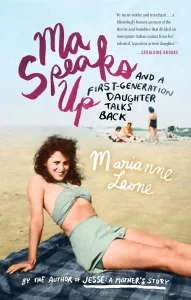
Ma Speaks Up: And a First-Generation Daughter Talks Back, Marianne Leone‘s memoir about growing up as the daughter of Italian immigrants, just outside of Boston, is an emotional roller coaster.
On any given day, during my less-than-an-hour commute, I would turn on the audiobook and go from laughing out loud to tears streaming down my face to anger and then back to laughter. I always got to campus feeling invigorated, and that’s no small feat for someone with a 4-month-old at home.
I told my students about how amazing this book was as we prepared for Marianne’s public reading at the Bates Film Festival. Then I told them about Marianne’s other moving memoir, Jesse: A Mother’s Story, which tells the story of her and her husband Chris’ unconditional love for their son Jesse, an honor-roll student, poet, and windsurfer, who had severe cerebral palsy, was quadriplegic, and unable to speak. Jesse died at the age of 17.
I gushed about these works and about Marianne, who is also an accomplished actress and Sopranos alum, and I don’t think my students fully believed me. I mean it all sounds pretty dramatic, and for Marianne to be coming to our film festival… well, you can’t fault them for thinking that I might have been exaggerating. But I wasn’t!
They went to Marianne’s reading at the festival, and then, they all got it. Many were so moved that they purchased her books on the spot! Books, like music and movies, can make you feel less alone in the world. Marianne’s work does that for me, and apparently, for my students as well! Maybe it will do the same for you.
The Left Coast Irregulars by Steven DePaul. A Bates parent, DePaul has lived many lives. He toured the world with rock bands, including a certain singer from New Jersey who you may have heard I’m a fan of. Then, he came off the road to start a career in television, becoming an Emmy Award-winning producer and director on shows like NYPD Blue.
Now, he’s an author! And he draws on all those previous lives in his remarkable debut novel: a mystery set in the world of rock ‘n roll tours! This page turner offers a backstage peek at a world that intrigues me but of which I have no direct experience, and the mystery kept me guessing until the very end. The Left Coast Irregulars left me wanting more (and wanting to ask Steven how many of the narrative’s events were based on true stories!). So, it’s a good thing that Steven’s second “Rock and Roll Confidential Mystery,” titled Frequently Asked Questions, has already been published… and rumor has it a third one is on the way!
Mercury Pictures Presents by Anthony Marra. “Maria Lagana has come to Hollywood.” That snippet is in the first sentence of this novel’s description. If you know me, you know those six words meant I had to read this book, even before adding an Italian-American author to the mix. I loved this novel! A story of Italy, immigration, filmmaking, and the film business, the story also includes mystery, romance, and generational conflict. It’s wonderful!
The Lincoln Highway by Amor Towles. I’m a little late to the party, as this novel been recommended here on the summer reading list before — and rightfully so. I finally got around to the audiobook, and I couldn’t stop listening to it. It made my commute along the Androscoggin River even more enjoyable. Check it out. You won’t regret it.
Anita Charles, Department of Education
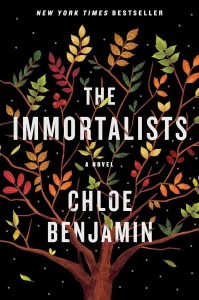
For the past couple of years, I have greatly enjoyed listening to audio books. The narration is part of the experience in an audio book, and the list below includes some of my favorites from the past year.
The Immortalists by Chloe Benjamin. This fictional book is based on this premise: “If you knew the date of your death, how would you live your life?” It follows 4 siblings who must face that question.
Unsheltered by Barbara Kingsolver.
Abide with Me by Elizabeth Strout ’77.
Music for Wartime by Rebecca Makkai. Short stories — beautifully written.
Ready Player One by Ernest Cline. I never expected to love this book as much as I did! There’s a movie based on it as well that I watched after reading (listening to) the book. Very clever premise of a future world where people live much of their lives as “avatars” within an online game. Puzzles must be solved and games-within-games must be won to secure the future of the “real” world.
Dogtripping by David Rosenfelt. Memoir about bringing 25 rescue dogs from California to Maine in three RVs.
Finding Me by Viola Davis. Memoir about Davis’s journey of her career. Audio version is narrated by the author.
Finding Freedom by Erin French. Audio version is narrated by the author. Beautifully written memoir about a rural Maine woman who finds her passion and courage in cooking, despite a lack of formal training.
Jonathan Cohen, Department of Philosophy
Most of my “reading” comes via audiobooks while I commute to Lewiston from Farmington, so it’s possible the thrill came from brilliant narration as much as by brilliant writing, but this year I enjoyed The Count of Monte Cristo by Alexandre Dumas, and Vanity Fair by William Makepeace Thackeray (a great name to go with a great book). The latter bills itself as “a novel without a hero” and has some of the best snarky writing I’ve ever heard, eventually building to some well-earned moral outrage, as well as some wonderfully subtle ways of delivering the news about what’s going on, e.g. sometimes nothing more than a carefully chosen word mid-sentence.
The former has some fabulous plot twists, to the point where I would be yelling to myself in the car, “Wait! That guy…is the same guy from 20 chapters ago!” Interestingly, both books turn crucially on the battle of Waterloo. Speaking of which, is War and Peace on your list?
Emily Colucci, Information and Library Services
The Secret Lives of Booksellers and Librarians: True stories of the Magic of Reading by James Patterson and Matt Eversmann with Chris Mooney. This book is incredibly inspiring and heartwarming. My mom grew up in her parents’ bookstore in Albuquerque, N.M. This was her start to developing a profound love for reading and books, which she has lots of in her and my dad’s home, making up their own personal library.
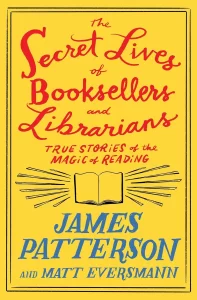
She has bestowed that knowledge as well as many of those same books and the love of reading to me, which is partially why I obtained my master’s degree in library and information studies and have worked in both public and academic libraries since 2015.
Encompassing each individual bookseller’s, librarian’s, and, in some cases, author’s personal testimony to loving to read and what they do — sharing their knowledge and love for ferociously absorbing information with their patrons — this book truly makes my heart happy.
This book is definitely one for the passionate soul who absolutely loves books, the joys of reading, and of course, devouring all kinds of information — enabling them to be the best critical and imaginative thinker possible.
To that front, I also truly hope that this book serves as a freeing outlet to (re)vitalize and emphasize the importance of booksellers, bookstores, librarians and libraries everywhere.
Renee Dana, Office of the Dean of the Faculty
The Immortalists by Chloe Benjamin. Following the stories of four siblings and how their lives are changed after they are told their death dates at a young age. Novel spans over five decades.
None of This is True by Lisa Jewell. Twisty turny psychological thriller following Josie and Alix as they develop their friendship. Split timelines between current day true crime podcast interviews and the lives of Alix and Josie.
Happy Place by Emily Henry. A summer story based in Maine about a group of friends on their annual friend trip and a second chance romance.
Hang the Moon by Jeanette Walls. Set in Virginia during prohibition, following the life of Sallie Kincaid. A story of strength, the family you are born into, and the family you choose.
Carrie Diaz Eaton, Program in Digital and Computational Studies
Imagination: A Manifesto by Ruha Benjamin. Use your imagination to see justice in the world — don’t stop dreaming!
Susan Dunning, Office of College Advancement
Vanderbilt: The Rise and Fall of an American Dynasty by Anderson Cooper. This was one of three books I read about the Vanderbilt family last year, and definitely the best of the three. I chose it because I was utterly fascinated by the fact that Anderson Cooper, whose mother was Gloria Vanderbilt (of jeans fame), is Cornelius Vanderbilt’s great-great-great-grandson. His telling of the family’s story is unflinchingly honest, but not mean-spirited — I loved it.
The Only Woman in the Room by Marie Benedict. A novel based on the true story of Hedy Lamarr that you probably never knew: her marriage to a Nazi arms dealer, her daring escape and eventual success in Hollywood, and her scientific contributions to modern communication.
All My Knotted-Up Life by Beth Moore. A refreshingly honest and authentic memoir from a Bible teacher who, even among Christians, is revered by some and despised by others. I loved hearing her story directly from her and continue to be inspired by her laser-focus on what is truly important.
Elizabeth Durand ’76
Current fiction: The Women by Kristin Hannah. So much of what I’ve read in the last several years has been set during World War II, often in France. This is a different war, different time, different countries — it’s hard to believe the main character set off for Vietnam as an Army nurse nearly 60 years ago.
My YA pick: all of the Stevie Bell books by Maureen Johnson. There are five so far; the first one (and you’ll want to read them in order) is Truly Devious.
Beach books: Funny Story by Emily Henry. Her best in several years.
Yours Truly by Abby Jimenez.
Classic mystery novel: Hide My Eyes by Margery Allingham. This is not the first of the Albert Campion books, but it’s one of my favorites.
Still See You Everywhere by Lisa Gardner. A mystery with many twists.
Melinda Emerson, retired colleague
The Winners (No. 3 of the Beartown Series) by Fredrick Backman. “Two years have passed since the events that no one wants to think about. Everyone has tried to move on, but there’s something about this place that prevents it. The residents continue to grapple with life’s big questions: What is a family? What is a community? And what, if anything, are we willing to sacrifice in order to protect them?” — Atria Books
Firekeeper’s Daughter by Angeline Boulley. “As a biracial, unenrolled tribal member and the product of a scandal, Daunis Fontaine has never quite fit in — both in her hometown and on the nearby Ojibwe reservation. When her family is struck by tragedy, Daunis puts her dreams on hold to care for her fragile mother. After Daunis witnesses a shocking murder that thrusts her into a criminal investigation, she agrees to go undercover. But the deceptions — and deaths — keep piling up and soon the threat strikes too close to home. How far will she go to protect her community if it means tearing apart the only world she’s ever known?” — Henry Holt and Co.
Warrior Girl Unearthed by Angeline Boulley. “Perry Firekeeper-Birch has always known who she is – the laidback twin, the troublemaker, the best fisher on Sugar Island. Her aspirations won’t ever take her far from home, and she wouldn’t have it any other way. But as the rising number of missing Indigenous women starts circling closer to home, as her family becomes embroiled in a high-profile murder investigation, and as greedy grave robbers seek to profit off of what belongs to her Anishinaabe tribe, Perry begins to question everything. In order to reclaim this inheritance for her people, Perry has no choice but to take matters into her own hands. She can only count on her friends and allies, including her overachieving twin and a charming new boy in town with unwavering morals. Old rivalries, sister secrets, and botched heists cannot – will not – stop her from uncovering the mystery before the ancestors and missing women are lost forever.” — Henry Holt & Co.
Murder in an Irish Pub by Carlene O’Connor. “The luck of the Irish runs out for a professional poker player in this mystery set in County Cork. Detective Sargent Macdara Flannery would lay odds it’s a simple suicide — after all, there’s a note and the room was locked. But officer Siobhán O’Sullivan suspects foul play, as does Foley’s very pregnant widow. Soon it’s up to Siobhán to call a killer’s bluff, but if she doesn’t play her cards right, she may be the next one taken out of the game.” — Kensington
Lessons in Chemistry by Bonnie Garmus. “Chemist Elizabeth Zott is not your average woman. In fact, Elizabeth Zott would be the first to point out that there is no such thing as an average woman. But it’s the early 1960s and her all-male team at Hastings Research Institute takes a very unscientific view of equality. Except for one: Calvin Evans, the lonely, brilliant, Nobel–prize nominated grudge-holder who falls in love with, of all things, her mind. True chemistry results.” — Doubleday
Family Fortune by Mignon G. Eberhart. “A great plantation isolated by the Civil War…its young and beautiful heiress…the ruthless brother with whom she struggles for her birthright…the mysterious lover whose claims of distant kinship she can only half believe…the lovely mulatto girl whose kinship she cannot deny…the maze of shameful family secrets and lies through which she flees–pursued by the danger that is her legacy and the savage death that well may be her fate.” — Aeonian Press
The Hike by Susi Holiday. “Four hikers enter the mountains. Only two return. But is it tragedy? Or treachery?” — Thomas & Mercer
The Nurse’s Secret by Amanda Skenandore. Skenandore “brings her medical expertise to a page-turning story that explores the evolution of modern nursing — including the grisly realities of nineteenth-century medicine — as seen through the eyes of an intriguing and dynamic heroine.” — Kensington
Port Chatham by Steven Douglas Brown. “In Alaska, people disappear at a startling rate and the visitors to Port Chatham are about to add to that number.” — Independently published
The Ragged Edge of Night by Olivia Hawker. “Germany 1942. Franciscan friar Anton Starzmann is stripped of his place in the world when his school is seized by the Nazis. He relocates to a small German hamlet to wed Elisabeth Herter, a widow who seeks a marriage, in name only, to a man who can help raise her three children. Anton seeks something too: atonement for failing to protect his young students from the wrath of the Nazis. But neither he nor Elisabeth expects their lives to be shaken once again by the inescapable rumble of war.” — Lake Union Publishing
The Stillwater Girls by Minka Kent. “Two sisters raised in fear are about to find out why in a chilling novel of psychological suspense from the author of The Thinnest Air.” — Thomas & Mercer
Marina Filipovic, Department of German and Russian Studies
Free: Coming of Age at the End of History by Lea Ypi. “I never asked myself about the meaning of freedom until the day I hugged Stalin. From close up, he was much taller than I expected,” reads the opening of a witty, ironical, and tastefully written memoir narrated through the eyes of a young girl about complex realities of Enver Hoxha’s regime in the early 1980s and post-communist Albania of the 1990s.
Theory of Sorrow by Slavenka Drakulić (translated from the Croatian by Vladislav Beronja). A novel about Mileva Marić, one of the first female students in Europe to study mathematics and physics in prestigious and all-male Zurich Polytechnic School at the end of the 19th century.
Drakulić weaves in fiction and facts to tell a story of Mileva’s persistent feelings of sadness that affect her academic career, her marriage to Albert Einstein, and result in a series of personal losses. An insightful literary treatment of chronic depression and, certainly, a non-standard portrayal of Mileva Marić, whose life has aroused literary and film interest over the past decade.
Dan Girling, Post & Print
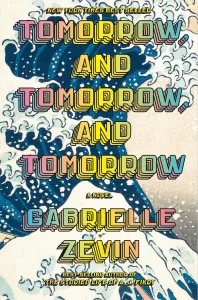
Tomorrow, and Tomorrow, and Tomorrow by Gabrielle Zevin. A story spanning over 20 years, this novel follows two characters who establish a video game development company. I enjoyed reading about the evolution of their friendship as the company grows and they face creative differences.
This Is How You Lose the Time War by Amal El-Mohtar and Max Gladstone. A science fiction novel with LGBTQ+ themes, this book is about two soldiers on opposite sides of a war fought through time. The story is told in letters the soldiers send to each other, as they jump back and forth through time and space.
The Phantom Tollbooth by Norton Juster. This children’s book is about a boy named Milo who receives a magic tollbooth that takes him to another world, the Kingdom of Wisdom. I revisited this classic this year and still found it entertaining. It has a lot of humor and wordplay, and a positive message about the importance of learning.
Five Little Pigs by Agatha Christie. This novel is a murder mystery about a famous painter who is poisoned while a group of friends are visiting his mansion. One unique part about this book is that the murder occurred sixteen years before the events of the book, with detective Hercule Poirot searching for the truth long after the evidence is gone. This was the first Agatha Christie novel I’ve read, but I enjoyed this and I look forward to reading more.
Dennis Grafflin, retired colleague, Department of History
Anything by Percival Everett is likely to be remarkable. I don’t know his poetry, but I’ve read two of his short-story collections, and they are excellent. (“The Appropriation of Cultures” in Damned If I Do is brilliant, if you like fiction that incorporates contemporary social commentary at the same time. A number of the stories in Big Picture are wonderful studies of fathers and sons, husbands and wives.)
I’ve read only two of his many novels. Wounded is about as perfectly constructed as a novel could be, and Walk Me to the Distance hit me hard for reasons that may be strictly personal. His latest, James, is getting lots of attention as a reimagining of Huckleberry Finn from the perspective of Jim instead of Huck, but I haven’t seen it.
Bruce Hall, Information and Library Services
I recommend Being Mortal: Medicine and What Matters in the End by Atul Gawande. He says that “being mortal is about the struggle to cope with the constraints of our biology.” While Gawande became a doctor “to push against these limits,” he has “seen the damage we in medicine do when we fail to acknowledge that such power is finite.”
Specifically, this book is about what we call “elder care,” “assisted living,” “nursing homes,” “memory care” or any of many other terms used to describe how we approach our own or our aging loved ones’ mortality, particularly over the last century. The issues are not simple and everyone is in a different situation.
To avoid that “damage” when his own father was facing a terminal disease, Gawande asked his father this question: “I asked him what trade-offs he was willing to make and not willing to make to try to stop what was happening to him.” Gawande’s experiences and frankness will be helpful to anyone who wants to be better prepared for this part of life.
I first learned of Atul Gawande from his earlier book The Checklist Manifesto: How to Get Things Right. It is a short, informative, and even fun account of the development of checklists as technology became more complex. Beyond that history, he covers how his hospital was able to improve patient outcomes by using checklists.
Joseph Hall, Department of History
The Abundance by Annie Dillard. This collection of essays includes selections from other collections of Dillard’s essays. Maybe you could think of it as her greatest hits or something like that.
I pulled it off the shelf in early April so I could read “Total Eclipse,” which she first published in 1982. A colleague recommended that I read it before I watched the total solar eclipse in northern Maine on April 8, and I was stunned by the essay’s brilliance. I read it twice. You should, too. And then enjoy the other essays in this marvelous collection. Or any collection of Dillard’s. She insists that we pay attention to the world around us. Thanks to her, I’m trying a little harder.
Small Things Like These by Claire Keegan. Keegan is renowned for her tightly woven novellas. I can only speak for this one, and it is a tiny, masterful snapshot. Keegan conveys a rich sense of Ireland in the early 1980s. She builds these vignettes into a powerful story that asks you to continue imagining its repercussions after the last page.
Mnemonic Ecologies: Memory and Nature Conservation along the Former Iron Curtain by Sonja Pieck. I should read more of my colleagues’ work. I’m glad I read this one.
With the collapse of the Iron Curtain and the reunification of East and West German in 1989, Germans had to decide how they would cultivate the border that once divided them. It was a strip scarred by the deaths of people who had tried to flee the east; it was a corridor filled with plants and animals who thrived in places largely devoid of human life. Sonja highlights how nature lives in human history, and humans live inextricably bound to the rest of the living world.
Lindsey Hamilton ’05, Center for Inclusive Teaching and Learning
When I picked up a copy of Remarkably Bright Creatures by Shelby van Pelt, I was skeptical that I would enjoy a book with the protagonist of an octopus, but I quickly was captivated. Marcellus is a grumpy giant Pacific octopus living in captivity (he escapes nightly) who becomes an amateur detective for his only human friend, the night custodian, Tova Sullivan, in order to bring her closure about her long missing son. I listened to this as an audiobook and Michael Urie did a wonderful job bringing the curmudgeonly and intelligent octopus to life.
Nina Hicks, Office of Student Financial Services
Just East of Nowhere by Scot Lehigh. This is a great debut novel by a Maine author, set in a Maine town and the main character attends Bates!
Bill Hiss ’66, retired colleague
Stranger in the Shogun’s City: A Japanese Woman and Her World by Amy Stanley. An intriguing approach to Japanese history. An early 1800s Japanese woman from the “snow country” of northwest Japan rebelled against every dictate of how a Japanese woman should behave, and after three divorces, made her way to Edo, which would become Tokyo.
We only know of her struggles for independence because she came from a literate family of Buddhist priests, which saved decades of letters as they tried to talk her into a compliant traditional role, which she rejected, even as she was often hungry and ill-clothed. Against her personal struggles came in the 1850s the forced changes to Japanese society, with its “double-bolted gates” to the outside world, as Admiral Perry brought to Japan his Black Ships with their 8-inch guns, against which the samurai were helpless.
Henry Thoreau: A Life of the Mind by Robert D. Richardson, Jr. Not a quick or light read, as the book traces the influences on Thoreau’s ideas, including a raft of European and Asian philosophers. But rewarding for seeing him in a far wider context of thinkers than his Concord and Transcendental friends, and far more involved than the cabin at Walden Pond would imply.
Knowing What We Know by Simon Winchester. This 2023 release is Winchester’s 33rd book, many of them fascinating, such as Krakatoa, on the 1883 volcanic eruption in Java, and his two books related to the Oxford English Dictionary, The Professor and the Madman and The Meaning of Everything.
This latest book has a very wide scale: tracing how humans have defined and kept track of knowledge. Much of it follows Winchester’s journalistic style, with lots of intriguing details and droll footnotes. But it is also a book conceived during Covid, written from the study rather than the road, with dozens of mini-chapters on everything from clay cuneiform tablets in Iraq and the Great Library at Alexandria to hand-held computers, Google and GPS.
Dispatch from Berlin, 1943 by Anthony Cooper and Thorsten Perl. In an ill-fated attempt to provide some press coverage for the massive British bombing raids over Germany, five non-British journalists were invited to accompany a single night of bombing over Berlin, with hopes to build support for Britain in the journalists’ home countries. One journalist was Norwegian, an admired poet and novelist; two were Australian; and two were Americans, including the renowned Edward R. Murrow.
Murrow’s radio broadcasts on the Blitz, that began with “This is London” and ended with “Good night and good luck,” were heard all over America, essentially inventing electronic journalism and substantially creating American support for World War II. (Walter Cronkite volunteered and trained for the bomber raid assignment but was not chosen as one of the five.)
Perhaps in contrast to the press coverage the British had hoped for, the raid demonstrated the high costs for everyone of strategic bombing: In most raids of several hundred bombers, 5 to 10 percent of the planes would be lost. Two of the journalists were shot down and killed with their crews; a third survived a crash and became a war prisoner.
This war prisoner was taken to see the destruction caused by the bombers, with German hopes that he would become a mouthpiece for them. He did not, but after his release wrote about the inaccuracy of strategic bombing: Vast portions of German cities were leveled or burned out, but often missed the military and transportation targets.
Amazing Grace: A Cultural History of the Beloved Hymn by James Walvin. A readable book for those interested in following a single hymn, from its religious and evangelical roots to the civil rights movement. Also an exploration of the powerful impact of music on American culture, much of it re-shaped by electronic communications from the first 1920s radio stations to the web.
Foreign Bodies: Pandemics, Vaccines, and the Health of Nations by Simon Schama. A history of the late-19th century development of vaccines, especially those for cholera and the bubonic plague.
Much of the book follows the life of Waldemar Haffkine, a Jewish microbiologist who fled Czarist oppression in Russia to find training in Europe, largely in Pasteur’s laboratories in Paris. He spent much of his life in India, battling both ignorance about the causes of diseases and British colonial resistance to giving authority over medical treatments to a foreigner. The book ends with an acid commentary on Republican hostility to Dr. Fauci over his leadership during the COVID crisis.
The Great Displacement: Climate Change and the Next American Migration by Jake Bittle. A journalist, Bittle examines various parts of America where climate change is forcing significant migrations due to ocean flooding, drought, heat, and violent storms.
Into Siberia: George Keenan’s Epic Journey Through the Brutal, Frozen Heart of Russia by Gregory J. Wallance. In 1885, George Keenan, a journalist with previous experience in Siberia, undertook an 8,000-mile journey of ten months to investigate the penal camps and mines to which Russian czars sent political reformers and revolutionaries (often with their families) as well as criminals.
For the czars, it both removed dissenters and supported the Russian oligarchy, as profits from gold and silver mines allowed the czars to avoid raising taxes on the nobility. Few prisoners ever returned to European Russia, and many never even reached their destinations: There were almost no railroads in Siberia, and the prisoners, in chains and guarded by Cossacks, were forced to walk for thousands of miles through terrible weather.
Keenan wrote an extended series of articles and a book on the Siberian prisons and slave labor camps, and gave thousands of lectures throughout America, which gradually turned American public opinion against Russia. The czarist use of Siberia to punish dissent, including most of the later Bolshevik leaders, was enormously expanded in Stalin’s gulag archipelago. The book is dedicated to Alexei Navalny, but published before his death in an Arctic prison.
Shakespeare’s Book: The Story Behind the First Folio and the Making of Shakespeare by Chris Laoutaris. To be sure, a 350-page book on the making and publication of the First Folio will be TMI for many. But as an English major drafted as a first-year student in 1963 by Miss Schaeffer to play Guildenstern in her production of Hamlet, this was for me a happy trip down a deep rabbit hole.
The Vice President’s Black Wife: The Untold Story of Julia Chinn by Amrita Chakrabarti Myers. Quite a remarkable book, about a personage about whom little by way of records have survived.
Julia Chinn was an enslaved teenage African American woman, given with dozens of other slaves and a farm in Kentucky to Richard Mentor Johnson, the politically ambitious son of a wealthy family with enormous land holdings. Trained from childhood as a house servant, Julia proved a highly skilled manager of Johnson’s farm, especially when he was elected to the Congress, then to the Senate, and finally served as vice president for Martin Van Buren, spending six months each year in Washington.
Johnson openly treated and referred to Chinn as his wife, had two daughters with her, but never freed her. She ran the farm and supervised the other slaves, kept the finances afloat (Johnson, an irresponsible social butterfly who loved to host expensive parties, was always in debt), and even supervised a boarding school on the farm for Choctaw teenage boys.
The book deals heavily with her extraordinary managerial skills, but also with the very limited blind eye to which the community would turn toward an interracial marriage. Julia died in her 30s of cholera, and Johnson’s family after his death destroyed all records of her life. Her daughters both married white men, and themselves presented with a farm and slaves, chose to “pass” in subsequent generations.
Enter the Aardvark by Jessica Anthony. Our colleague Jess Anthony, lecturer in English and Bates Class of 1996, is a most imaginative writer. Her previous novel, The Convalescent, is a marvel, and this one is parallel. Wildly inventive prose that made me slow down to savor sentences, and not infrequently sent me to a dictionary. It’s biting current political satire that involves a 19th-century taxidermist and a stuffed aardvark — how Jess pulls it off is a wonder.
Shonna Humphrey, Sponsored Programs and Research Compliance
Right now, I’m loving ADHD is Awesome by Penn and Kim Holderness. If you struggle with how atypical brains work, this could be a great resource. Bonus for it being written in a funny, conversational style with practical tips for navigating relationships.
I’m also excited about Joyce Maynard‘s novel How the Light Gets In, a follow up to Count the Ways. It’s based in New Hampshire, and, for me, it’s a nice mix of “beach read” and “lit fic.” There’s enough substance in this series to feel invested, but it’s light enough to read just for fun.
Speaking of beach reading, I am also catching up on Jacqueline Winspear‘s Maisie Dobbs series. This is an easy, 1920s-era mystery collection, and the final book, The Comfort of Ghosts, is out now.
I’m most looking forward to Lovely One, Ketanji Brown Jackson’s memoir. It’s out in September.
Will Hyland, College Store
Flood Tide by Albert Waitt ’83. Bates alumnus Albert Waitt is back with his second book, Flood Tide, in the LT Nichols mystery series. After The Ruins of Woodman’s Village kicked off the series last year, Waitt’s sequel carries on the crime-solving legacy of main character LT Nichols. Set in a fictional coastal Maine town, I recommend them both for their witty dialogue, suspenseful storylines, and local flavor.
The American Daughters by Maurice Carlos Ruffin. This historical fiction novel recently discovered by the College Store staff follows an enslaved Black woman in New Orleans during the Antebellum period. Separated from her mother, the protagonist meets a new friend who introduces her to a secret society of spies aiming toward abolition and freedom.
Masters of the Air by Donald Miller. Now adapted as a hit miniseries on Apple TV+, Donald Miller’s written history of the American 100th Bomber Group during World War II is a thorough account of our country’s greatest generation.
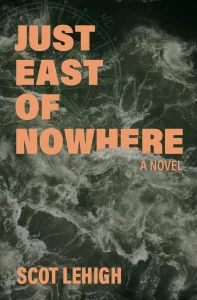
And while the television series is well-done and a product of great minds too, Miller was able to take me back in time to meet those unheralded heroes who conquered the skies and laid the groundwork for Western Europe’s liberation.
There will sadly come a day when these stories can no longer be told from its eye-witnesses. Thankfully the author has provided us with this account of “The Bloody Hundredth.”
Just East of Nowhere by Scot Lehigh. Maine native and Colby alumnus Scot Lehigh debuts his first novel — a coming of age story in Down East Maine. A small-town drama that’s gripping and relatable for those of us who hail from tiny map dots.
Caleb Ireland ’23, Program in Environmental Studies
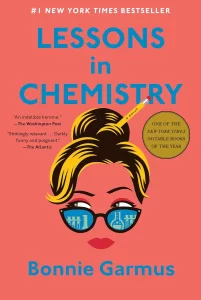
Lessons in Chemistry by Bonnie Garmus. Out of the various novels that I read this academic year, this stood out as a captivating story that brilliantly blends social commentary, humor, and science.
Garmus crafts a compelling narrative around Elizabeth Zott, a chemist in the U.S. during the early 1960s who defies sexist societal expectations with her intelligence, wit, and determination. The novel tackles serious themes and contains insightful observations, vivid characters, and clever dialogue, making it a truly engaging read. I recommend it to anyone who is looking for a smart, well-written story with a strong, inspiring protagonist.
Emily Kane, Department of Sociology
I like to suggest some novels plus one academic book by a sociologist. For this year, some of the many novels I particularly appreciated were:
Angie Cruz’s How Not to Drown in a Glass of Water is a novel written in the form of a series of reports from monthly sessions a 50-something Dominican woman in NYC has with a counselor in a state-sponsored jobs program. It took me a few chapters to get into the rhythm but once I did, I really enjoyed it. It’s funny, engaging, and addresses some very important social issues.
Margaret Verble’s Stealing is about an indigenous child forcibly removed from her family, and her journey to escape the religious boarding school where she is held against her and her family’s will. It’s emotionally intense, as are the two below, and also really well plotted and written.
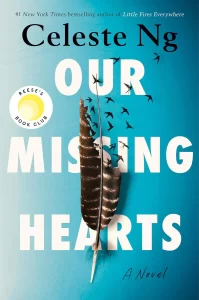
Jesmyn Ward’s Let Us Descend is a multigenerational family saga about enslaved people, with richly written characters, a strong plot, and a compelling exploration of the horrors of enslavement that spans from the middle passage to multiple sites in the U.S. south.
And Celeste Ng’s Our Missing Hearts, another family saga, is set in a dystopic near-future that feels very possible. The novel explores immigration, culture, power, censorship, and the surveillance state within a fast-paced plot that is very engaging.
And my recommended academic book for this year is sociologist Matthew Desmond’s Poverty by America. A previous book of his, Evicted, won a Pulitzer, and this one is also accessibly written, carefully researched, and very compelling in the argument it makes.
Alison Keegan, Office of the Dean of the Faculty
Martyr! by Kaveh Akbar. Lyrical and masterful is how I’d describe this debut. A strange, messy, beautiful book about, quite simply, our life meaning and what we bring and how we are willing to live. Akbar is first and foremost a poet and his gorgeous prose is enticing and profound.
Adelaide by Genevieve Wheeler. Sometimes a book hits you in ways that are unexpected and beautiful and deeply moving. This was that book for me. A raw, emotional, relatable journey of hope, despair, love, grief, and so much more all wrapped in the messy knot called life.
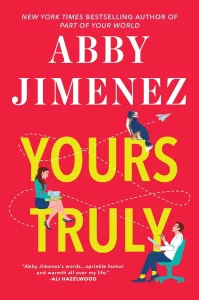
The Collected Regrets of Clover by Mikki Brammer. At first glance, one might think this is a book about dying, but really, it’s a book about living, and how we make the most of the time we have here. Two of my favorite quotes from this book: “Grief is just love looking for a place to settle.” and “Don’t let the best parts of life pass you by because you’re too scared of the unknown.” If you needed a sign, this is it. Go live.
Beach reads that are juicy and addictive:
- Yours Truly and Just for the Summer by Abby Jimenez.
- The Paradise Problem by Christina Lauren (and really any Christina Lauren book).
- Happily Never After by Lynn Painter.
- The Husbands by Holly Gramazio.
- The Whispers by Ashely Audrain.
Daniel Lindahl, Information and Library Services
The Poacher’s Son (the first novel) and the entire Mike Bowditch series by local author and former editor of Down East magazine Paul Doiron. Definitely best to read them in order. This is an ongoing series of well-written fiction centering around a Maine game warden, featuring a regular dose of Maine vignettes (some real places, some just based on real places). Probably not new to most of us, but well worth the recommendation if you haven’t read them. Added bonus, as Paul Doiron is a Maine figure, he pops up from time to time for talks and book signings.
Stolen Focus: Why You Can’t Pay Attention — And How to Think Deeply Again by Johann Hari. The New York Times best-selling author examines the growing climate of distraction, using both research findings and personal exploration to uncovering the root causes of the dwindling ability to concentrate many of us feel plague our modern lives.
Digital Minimalism: Choosing a Focused Life in a Noisy World by Cal Newport. An examination of distraction and diminished well-being in a social media world, along with a strategy to “declutter” and get back to pre-iPhone life before the constant, attention-demanding age of over-notification.
Lessons in Chemistry by Bonnie Garmus. I’ll be one of many recommending this first work of long-time copywriter, and all-around fascinating person. While the Apple+ series that is based on it is fantastic, it pales in comparison to the book. Just fantastic.
The Three-Body Problem by Liu Cixin. If you like science fiction and you’re about to watch the new Netflix version, maybe read the book first. It really is quite good.
Red Mars by Kim Stanley Robinson. The first book of the Mars trilogy. While the writing is occasionally — often — dense with scientific content, the parallels between his account of the colonization and terraforming of Mars, interlaced with a detailed account of both human exploration juxtaposed with the pervasive corruption of world politics is eerily reminiscent of modern life on Earth.
Added bonus, if you’re the type of reader that likes to be challenged with concepts and vocabulary you’ll likely need to chase down, this is an excellent series. I’d imagine “regolith” is a word familiar to plenty of folks at the college, it was just one of the many terms that sent me off exploring enriching rabbit holes while reading this series.
The Murderbot Series starting with All Systems Red by Martha Wells. A light, fast-paced sci-fi series centered on a very human, very conflicted cyborg constructed as a Security Unit to protect a scientific expedition. The name “Murderbot” comes from the cyborg herself, and she’d like nothing more than to hide away and binge old television shows she pirates from the net.
The writing is brisk and entertaining, though I will warn that it is at times quite graphic in its depictions of battles and such. It is equally compelling in the unfolding of her connection and dependence on relationships, a development she often laments and finds annoyingly inconvenient.
I started this series with inexpensive, shorter Kindle downloads, but as with many popular series, the Kindle versions ramp up significantly in price, so I ended up finding most of these through the library, starting at about the third book.
Kathy Low, Department of Psychology
- Hollow Land by Jane Gardam.
- Avitram Ghosh’s works (fiction trilogy and non-fiction books on opium trade, global warming).
- The Fraud by Zadie Smith.
- Our Missing Hearts by Celeste Ng.
- Tom Lake by Ann Patchett.
- We Sinners and End of Drum Time by Hanna Pylväinen.
- Worm by Edel Rodriguez.
- North Woods by Daniel Mason.
- Case Histories by Kate Atkinson.
- Fates and Furies and The Vaster Wilds by Lauren Groff.
- We Have Always Lived in the Castle by Shirley Jackson.
- The Heaven and Earth Grocery Store by James McBride.
- Old God’s Time by Sebastian Barry.
- And I read Stephen King for the first time in 30 years, and enjoyed the “Holly” character and series.
Sarah Lynch, Program in Classical and Medieval Studies
I picked up Sequoia Nagamatsu’s How High We Go in the Dark based on its cover and it is a searing read. Set during and after a future, devastating pandemic, it tells the stories of the scientists and victims and bereaved family and friends with humanity and grace. It also poses a question that we have all avoided: Should we just go back to “the way it was” or should we reach for something different, even better?
For the short story readers out there, I also enjoyed Isak Dinesen‘s Babette’s Feast where one meal comes to represent the power of love, friendship, and kindness across time and cultural differences. Best read before an excellent dinner!
Maggie Maurer-Fazio, retired colleague, Department of Economics
- I recommend two books by Tim O’Brien, America Fantastica and The Things They Carried.
- Tom Lake by Ann Patchett.
- Dragon Teeth by Michael Crichton.
- The One Hundred Years of Lenni and Margot by Marianne Cronin.
- The Girl with All the Gifts by M.R. Carey.
Christine Murray, Information and Library Services
There were two books, one fiction and the other non-fiction, that I read over the past year and made a real, lasting impression on me. Wellness by Nathan Hill is a smart and funny novel about modern obsessions with self-improvement, consumption, and social media through the lens of a married couple experiencing the ups and downs of a long-term relationship.
The second was Killers of the Flower Moon by David Grann. Recently made into an Oscar-nominated film, this true crime book chronicles the widespread murders of members of the Osage Nation in Oklahoma a century ago and the development of the FBI as it investigated the crimes.
Tom McGuinness, Office of Institutional Research, Analysis, and Planning
Free: Coming of Age at the End of History by Lea Ypi.
Kerry O’Brien, retired colleague
In All That She Carried: The Journey of Ashley’s Sack, a Black Family Keepsake, historian Tiya Miles uses the surviving material possession of an enslaved woman’s life — a sack — to piece together the experiences of enslaved people, especially girls and women. While her history of Rose and her daughter Ashley is, by necessity, speculative, it is grounded in evidence of the experiences of other enslaved people. The way that Miles uses this single object to spin a deeply personal family story and the broader history of slavery is virtuosic.
Worn: A People’s History of Clothing by Sofi Thanhauser is no history of fashion. Instead it’s a sobering look at the historical, economic, biological, environmental, and sociological impact of the clothing we wear. Thanhauser weaves a global history that features phenomenal technologies, international trade, colonial exploitation, enslavement, the rise of the labor movement, and the climate impact of clothing. The book really makes you think about who makes what you wear and at what cost. Start making your own clothes!
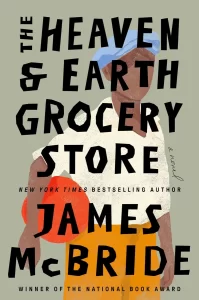
The Heaven and Earth Grocery Store by James McBride is the story of a poor Pennsylvania community of black pioneers of the Great Migration and immigrant Jews from Eastern Europe, both groups ostracized from mainstream white society. The story — part mystery, part thriller, part racial political intrigue, part love story — is incredibly well constructed and reminds us why neighborhoods and mutuality matter.
The O’Briens by Peter Behrens (an eponymous book title if ever…) is a 20th-century family saga about dirt-poor Irish-Canadian immigrants, some of whom are confined to convents (the girls) while others make it big in the westward expansion of the railroad. Several generations of O’Briens are impacted by the Depression, wars, and changing roles for women, and take the reader from Alberta to Los Angeles and Montreal to Kennebunk.
And you can’t go wrong with these two great Edith Wharton novels, The Age of Innocence and The Custom of the Country. Blind ambition! Tarnished reputations! Infatuated chumps! Financial ruin! Bamboozling! Gilded Age shenanigans!
Ben Peck, Information and Library Services
A Memory Called Empire and its sequel A Desolation Called Peace by Arkady Martine. I loved this pair of great science fiction books that explore identity, colonialism, and politics.
The protagonist is a diplomat with secret technology implanted in her brain that allows her to communicate with her predecessor, but the technology glitches when she arrives at the center of the massive empire threatening to consume her small outpost, and she is swept up in a coup attempt while trying to save herself and her home.
The author, a scholar with a wide-ranging academic background in the Byzantine Empire and city planning, applies her knowledge to create a complex world and spins a tale with drama and intrigue alongside great character development and allegory.
Peter Philbin ’22, Museum of Art
Here are two of my favorite books from the past year:
Hard-Boiled Wonderland and the End of the World by Haruki Murakami, 1985 (translated into English by Alfred Birnbaum in 1991). A really unique novel that features two distinct parallel narratives combining science fiction, hardboiled detective stories, magical realism, and more. It is somehow funny, tragic, comforting, and deeply twisted all at the same time. Highly recommend it.
Wise Blood by Flannery O’Connor. A very eccentric novel about Hazel Motes, a Southern World War II veteran who sets out to preach a gospel of anti-religion to try and resolve a lifelong crisis of faith.
Melinda Plastas, Program in Gender and Sexuality Studies
K-Ming Chang’s Gods of Want: Stories is funny, timely, dystopic, hungry, and queer as hell. Her writing rocks, rocks, rocks.
In Stitching Love and Loss: A Gee’s Bend Quilt, art historian Lisa Gail Collins offers a deep study of a singular quilt created in 1942 by Missouri Pettway in honor of her husband who had recently passed away. Pettway assembled the quilt from remnants of his work clothes. Collins’ elegiac work engages with questions of grief, loss, community and creativity. As one reviewer writes: “It is a praisesong for the artistry, resilience and resistance of Black women in Alabama’s rural Black Belt.”
Sarah Potter ’77, Bookstore Director Emerita
The Last Bookshop in London by Madeline Martin. A tale of love and literature, blackouts and bombs and a bookstore that survived the Blitz.
Mad Honey by Jodi Picoult and Jennifer Finney Boylan. A powerful story that could not be put down.
Absolution by Alice McDermott. A novel that begins in Saigon in the early 1960s and leaves a lasting impression of America’s role in Southeast Asia.
Somebody’s Fool by Richard Russo. Another entertaining read from Russo in his “fool” series (Nobody’s…Everybody’s…).
Chronicles of a Radical Hag by Lorna Landvik. Because I enjoy Lorna Landvik’s writing and I identify with this title, this was a good read for me — witty, warm, funny.
Stephanie Pridgeon, Department of Hispanic Studies
Tomorrow and Tomorrow and Tomorrow by Gabrielle Zevin was the best book I read in 2023. I am not a gamer by any means, but the beautiful imagery of Zevin’s prose made me appreciate the design of video games.
Having said I’m not a gamer, the references to Super Mario Bros and Oregon Trail offer nostalgic delight to any elder millennial. The metaphors and images from the video games shed light on one the novel’s authentic, compelling stories of childhood friendships that wax and wane into adulthood. And the novel manages to meaningfully foreground the complex dynamics between individuals’ racial and ethnic identities and disabilities in these stories of friendship and loss.
Kirk Read, Department of French and Francophone Studies
In no particular order: entertaining, educating, soothing, questioning myself throughout the year. Most soothing and lovely for last.
Breath: The New Science of a Lost Art by James Nestor. Transformative for me. Amazing history and insight of how breath and well-being are connected. Practical tips and practices which truly helped me. You’ll never breathe through your mouth again.
Night of the Living Rez by Morgan Talty. Gritty interconnected stories of people living on the edges of happiness, misery, survival, and strife. Honest, painful, funny.
I Don’t Want this Poem to End by Mahmoud Darwish. Gorgeous poetry by a Palestinian icon. Beautiful.
Thinking about injustice and various radical ruminations on economy and race: Freedom is a Constant Struggle: Ferguson, Palestine, and the Foundations of a Movement by Angela Davis. I listen to anything this friend of Bates has to say with open ears and heart. And then reread her autobiography which so moved me as a high school junior.
Begin Again: James Baldwin’s America and Its Urgent Lessons for Our Own by Eddie Glaude. Smart, beautiful homage to Baldwin and Glaude’s own trajectory through this man’s life and wisdom. Baldwin said it all so long ago it seems. We need to pay better attention!
Less Is More: How Degrowth Will Save the World by Jason Hickel. Recommended by a best friend who sees economic injustice imbedded in capitalism as central to our inability to heal and sustain ourselves as a country.
Breaking Bread: Essays from New England on Food, Hunger, and Family, edited by Deborah Joy Corey and Debra Spark. Many Maine luminaries weigh in on food’s comfort and joy. And other related issues of wealth and want and food. On my bedside stand for dream preparedness!
For the francophones, my student’s favorite author Fatou Diome, a Senegalese French powerhouse who tells it like it is. La Préférence Nationale offers short stories about post-colonial realities both in France and Senegal. Her use and reframing of French cultural icons make one wonder if the master’s tools can be used to dismantle oppression.
Finally, This is Happiness by Niall Williams. A gorgeous novel on electricity coming to a small town in Ireland. Quirky characters and sweet relationships. You cannot read it without hearing the Irish lilt. Exquisite writing. Did not want it to end.
Adrienne Shibles ‘91, Department of Athletics
Democracy in Chains: The Deep History of the Radical Right’s Stealth Plan for America by Nancy MacLean.
Under the Sky We Make: How to be Human in a Warming World by Kimberly Nicholas.
Sharon Saunders, Information and Library Services
Between Two Kingdoms by Suleika Jaouad. “A deeply moving memoir of illness and recovery that traces one young woman’s journey from diagnosis to remission to re-entry into ‘normal’ life.” Following her remission, Suleika embarks on a road trip of healing and self-discovery. I also recommend her Isolation Journals blog on Substack.
Samantha Sigmon, Museum of Art
Topless Cellist: The Improbable Life of Charlotte Moorman by Joan Rothfuss. This biography of avant-garde musician and artist Charlotte Moorman has short chapters and lots of photographs, and is a really fun overview of her surprising and singular life. Like all of us, she was a complicated character, but her determination, work ethic, and passion for contemporary art even when people often misunderstood her, underestimated or belittled her, and poked fun at her work is inspiring — especially, I would think, for recent college grads.
Coming out of Arkansas as a classical cellist who then studied at Julliard, Moorman refused to be just another unknown symphony musician and instead interpreted works by Yoko Ono, John Cage, and many others while working closely with artist Nam June Paik. While she is notoriously known for taking her clothes off while she played cello, what inspired me was the epic avant-garde performance festivals she produced year after year in some of the biggest and oddest venues in New York City (The Twin Towers, boats, islands, etc).
She did so much to champion contemporary art on the fringe in the 1960s and 70s, and often these producers, planners, and organizers don’t get the credit for the tedious and un-fun, never-ending work it takes to put together these arts events time and time again. Beyond her performances, these events became her great artwork. A true original who collaborated with all those around her, Moornan reminded me of the need to take risks, break out of the mold, and confidently forge ahead.
Deirdre Stires, Bates Communications Office
Two books I reread in the past year spoke profoundly about viewpoints, and are worth a read if you enjoy seeing the world from a very different perspective.
The first was one recommended to me in graduate school by one of my advisors: John Howard Griffin‘s Black Like Me, a memoir from a journalist who medically darkened his skin and then traveled as a vagabond through the South in the 1950s documenting how he was treated. It’s a shocking and troubling account of a man who, because of the fact his skin has changed colors, becomes terrified and psychologically unhinged. First printed in 1962, it’s still just as relevant today.
The second book was Barack Obama‘s Promised Land, which reads like a novel and at times, despite the story of how Obama inherited one of the worst financial crises in the nation’s history, is even funny. It also provides insight into how difficult the office of the U.S. president is on a young family.
It explains in detail how Michelle Obama was not a fan of the idea, but how President Obama convinced her to let them pursue the White House because, he said, then every child who looks different will see themselves there. I can’t find the book at the moment to offer President Obama’s exact quote, but I remember exactly what Michelle said in response: “Well, honey. That’s a pretty good answer.”
Lea Staedtler, Center for Purposeful Work
The Light Pirate by Lily Brooks-Dalton. Set in the (possibly not-so-distant) future, humanity has given up on Florida, which has been ravaged by hurricanes and rising sea levels. The story follows Wanda as she grows up, meets others who chose to stay behind, and learns to adapt to the changing environment. It’s a beautifully written book, sometimes heart-breaking, sometimes hopeful, that stuck with me for a very long time, and made me grapple with the question, “What will our world look like in 50 years?”
Beartown Trilogy (Beartown, Us Against You, The Winners) by Fredrik Backman. It’s a story about a tight-knit small town, a successful junior hockey team, and big dreams. It’s also a story about violence, and the price people, individually and collectively, are willing to pay to make those dreams become a reality.
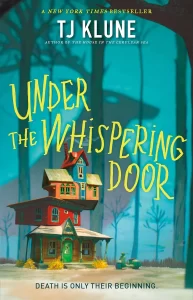
Under the Whispering Door by TJ Klune. I have yet to read a book by TJ Klune that I didn’t love and didn’t make me bawl my eyes out for one reason or another. In this book we meet Wallace, who refuses to cross over into the afterlife after his death, and falls in love with the ferryman. Faced with an ultimatum, he reflects on all the little and big moments he missed and tries to live a lifetime in just seven days, before having to move on into the unknown.
No Ordinary Assignment by Jane Ferguson. This memoir about Ferguson’s time as a war correspondent is a fascinating insight into conflict zones from the perspective of a news reporter. Not only does she tell both moving and harrowing stories of her time in the Middle East and Afghanistan, she also grapples with deeper moral questions about her responsibility to raise awareness of the suffering of the people through TV reporting, while ultimately being a bystander, who has the freedom to leave when the conflict zone becomes too dangerous.
Anne Thompson, retired colleague, Department of English
Three wonderful books to recommend this year:
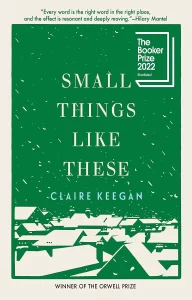
Small Things Like These by Claire Keegan. In 1985 Ireland, a coal merchant is delivering an order to a local convent. He encounters a young girl who is trying to run away from what turns out to be one of the infamous laundries of that time. A short book, but absolutely unputdownable.
The Heaven and Earth Grocery Store by James McBride. In a small town in 1936, Pennsylvania, Jews, immigrants, and black people live side-by-side, sometimes peacefully, sometimes not, often funny but sometimes heartbreaking and always full of the music of the times (Louis Armstrong, e.g.) The plot is too complicated to explain but full of unforgettable characters.
The Covenant of Water by Abraham Verghese. Full disclosure, the story is 700 pages long. But it will pull you in in an extraordinary way. Covering more than 70 years in the lives of a family in southern India, it begins with an arranged marriage between a 12-year-old girl and a much older man. They come to love each other very much but there’s also a family tragedy, whereby something called “The Condition” leads to the unnatural death by water of several family members. If you read his earlier novel. Cutting for Stone, you will not be surprised to know that there’s a good deal about medicine and doctors.
Darryl Uy, Office of Admission
Reading with Patrick: A Teacher, a Student, and a Life-Changing Friendship by Michelle Kuo. A powerful look at race and inequality in the Arkansas Delta and the transformative power of literature and caring teachers.
Under the Whispering Door by TJ Klune. A queer version of the movie Ghost told with Klune’s signature creativity, humor, and heart. For anyone who has lost someone, this book will make you cry, but it will also make you laugh, find joy and love again, and it will help you heal.
True Biz by Sara Nović. A brilliant story that explores Deaf culture and the Deaf community. There are even sign language pictorials sprinkled throughout the book!
Other highlights:
- Lessons in Chemistry by Bonnie Garmus.
- Tomorrow and Tomorrow and Tomorrow by Gabrielle Zevin.
- In the Lives of Puppets by TJ Klune.
- The Immortalists by Chloe Benjamin.
- All the Light We Cannot See by Anthony Doerr.
William Wallace, Department of Education
The Forest: A Fable of America in the 1830s by Alexander Nemerov. I’ve been a longtime fan of Nemerov’s work. Here he gives us a thoughtful consideration of the forest in 1830s America, addressing its literal as well as figurative associations.
Beautifully lyrical and evocative, one finds surprises on every page, owing to the broad roster of writers, artists, and historical figures that he discusses, including James Fennimore Cooper, Ralph Waldo Emerson, Washington Irving, Elijah Parish Lovejoy, Nat Turner, and The Hudson River School painters, among others. Elegiac in light of our current ecological and sociopolitical moment, the forest emerges as a fragile figure for a fraught and conflicted country.
Outlaw Cook by John Thorne with Matt Lewis Thorne. Few are the cookbook authors who draw you in on the strength of their prose, but John and Matt Lewis Thorne pass the test.
I’ve enjoyed several of their books over the past year and especially appreciate how they chronicle the unfolding of each recipe from its conception through its culmination, enfolding it into their lived experience. Not bound to culinary codes or conventional wisdom, the Thornes are hyperattentive to the subtleties of flavor and texture, writing with a precision that makes it only honest to be an outlaw cook.
Matt Von Vogt, Academic Support Services
Alfie and Me by Carl Safina. This is a terrific book by zoologist/writerSafina about his unlikely encounter and bond with an injured, fledgling screech owl, Alfie, during the pandemic. He writes with sensitivity (and a ton of great science) about his connection to Alfie, the mysteries of wild animals, and our own place in the natural world. All of this taking place at the start of and height of the Pandemic when social isolation produced a need for optimism, humor, and light.
Anne Williams, retired colleague, Department of Economics
Three non-fiction books that impressed me in the past year:
The Gentle Art of Swedish Death Cleaning by Margareta Magnusson. If Marie Kondo strikes you as too much of a drill sergeant, try this book. It’s funny, and the topic is important.
Harriet Jacobs, A Life by Jean F. Yellin. A remarkable memoir of an escaped slave who became an emancipation activist in the North.
How Minds Change by David McRaney. This book helped me understand the importance of community instead of facts in the evolution of one’s thinking.
Fiction I have enjoyed:
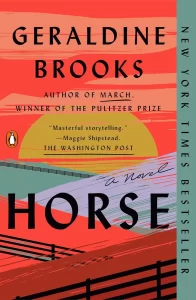
Lessons in Chemistry by Bonnie Garmus. Sheer fun.
Horse by Geraldine Brooks. Perspectives on race and horses from pre-Civil War times and today.
The Great Transition by Nick Googins. A futuristic view of climate change.
Exit by Belinda Bauer. An intriguing mystery.
I’ve also read and enjoyed more mysteries/thrillers by C.J. Box and Michael Connelly.
Marianne Williams, Information and Library Services
Subtract: The Untapped Science of Doing Less by Leidy Klotz. Klotz argues that we tend to choose addition over subtraction when it comes to problem-solving. Through different examples in engineering, architecture, art and business, he advocates for re-examining issues in life and work by what we can take away rather than add. This book does not need to be read cover to cover to understand his approach, but the case studies he presents offer a great new insight into solving some of life’s frictions.
Saving Time: Discovering a Life Beyond the Clock by Jenny Odell. Jenny Odell proposes a new way of thinking about time, examining and incorporating ecological rhythms to foster a more humane and hopeful existence outside the confines of work and profit. I particularly enjoyed her insights into concepts of the apocalypse, and her gentle humor in talking about topics that often feel hopeless, like overconsumption and climate change. Highly recommend!
The Country of the Blind: A Memoir at the End of Sight by Andrew Leland. If you are a fan of This American Life, you’ve likely heard some of Leland’s humorous and insightful stories about losing his vision to a degenerative eye disease. This memoir brings them together and expands his personal story along with a well-researched history of treatment of visual impairment and blind culture in America. His detailed explanation of the physical experience of blindness reframed the concept of disability for me, and I’d encourage all to read it.
Rachel Wray, Office of College Advancement
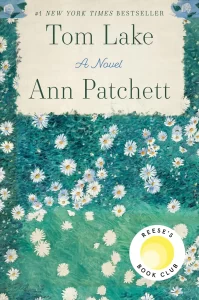
Mammoths at the Gates by Nghi Vo. This is the fourth in a series of novellas, but they can be read in any order. They are the stories of Cleric Chih, a member of a religious order that is tasked with taking down the stories of others. This one is a particularly lovely story about homecoming and loss and personal growth.
Tom Lake by Ann Patchett. A mother tells stories of her long-ago summer romance with a famous actor to her three daughters as they pick cherries at their Michigan farm during the summer of 2020.
Mollie Woodworth, Program in Neuroscience
I have been on a Barbara Kingsolver kick lately. I started with Demon Copperhead (2022) (and then I took a detour to read David Copperfield (1850) by Charles Dickens for comparison purposes). After that, I went back and read Kingsolver’s The Poisonwood Bible (1998) which I had somehow never read. Kingsolver is an exceptionally creative, expressive story teller and both books bring the reader along on odysseys that are hilarious, heart wrenching, and non-stop.
I highly recommend these two books and I look forward to reading more of her work.
Eileen Zimmerman, Information and Library Services
I thoroughly enjoyed The Frozen River by Ariel Lawhon. This book takes place in Hallowell, Maine, in the late 1700s. The main character is a midwife, Martha Ballard, who is remarkable. The author takes you back to the 18th century and gives you a great deal to think about. This is historical fiction, but based on a character, Martha, who actually existed. The characters were engaging and the story well told.
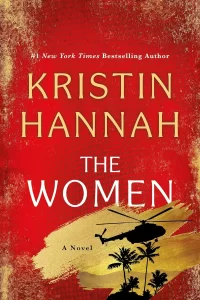
The Women by Kristin Hannah is the story of a young, well-off nurse who goes to Vietnam to serve as an Army nurse right after graduating from nursing school. Kristin Hannah takes time to develop characters fully. There is a lot going on in this book and sheds light on a difficult period in American history.
You are pulled into this story early on as Frankie the nurse starts her career and becomes an excellent surgical nurse, then you follow through her tours of duty, and suffer with her as she returns home. Another well-written historical fiction worth the read.
